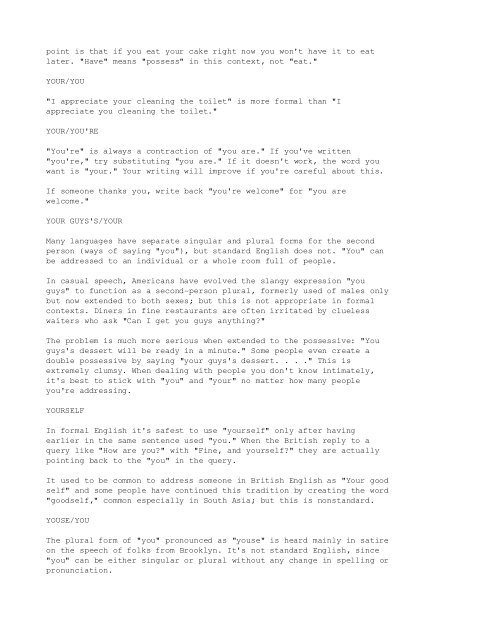Common_Errors_in_English_usage
Common_Errors_in_English_usage
Common_Errors_in_English_usage
Create successful ePaper yourself
Turn your PDF publications into a flip-book with our unique Google optimized e-Paper software.
po<strong>in</strong>t is that if you eat your cake right now you won't have it to eat<br />
later. "Have" means "possess" <strong>in</strong> this context, not "eat."<br />
YOUR/YOU<br />
"I appreciate your clean<strong>in</strong>g the toilet" is more formal than "I<br />
appreciate you clean<strong>in</strong>g the toilet."<br />
YOUR/YOU'RE<br />
"You're" is always a contraction of "you are." If you've written<br />
"you're," try substitut<strong>in</strong>g "you are." If it doesn't work, the word you<br />
want is "your." Your writ<strong>in</strong>g will improve if you're careful about this.<br />
If someone thanks you, write back "you're welcome" for "you are<br />
welcome."<br />
YOUR GUYS'S/YOUR<br />
Many languages have separate s<strong>in</strong>gular and plural forms for the second<br />
person (ways of say<strong>in</strong>g "you"), but standard <strong>English</strong> does not. "You" can<br />
be addressed to an <strong>in</strong>dividual or a whole room full of people.<br />
In casual speech, Americans have evolved the slangy expression "you<br />
guys" to function as a secondperson plural, formerly used of males only<br />
but now extended to both sexes; but this is not appropriate <strong>in</strong> formal<br />
contexts. D<strong>in</strong>ers <strong>in</strong> f<strong>in</strong>e restaurants are often irritated by clueless<br />
waiters who ask "Can I get you guys anyth<strong>in</strong>g?"<br />
The problem is much more serious when extended to the possessive: "You<br />
guys's dessert will be ready <strong>in</strong> a m<strong>in</strong>ute." Some people even create a<br />
double possessive by say<strong>in</strong>g "your guys's dessert. . . ." This is<br />
extremely clumsy. When deal<strong>in</strong>g with people you don't know <strong>in</strong>timately,<br />
it's best to stick with "you" and "your" no matter how many people<br />
you're address<strong>in</strong>g.<br />
YOURSELF<br />
In formal <strong>English</strong> it's safest to use "yourself" only after hav<strong>in</strong>g<br />
earlier <strong>in</strong> the same sentence used "you." When the British reply to a<br />
query like "How are you?" with "F<strong>in</strong>e, and yourself?" they are actually<br />
po<strong>in</strong>t<strong>in</strong>g back to the "you" <strong>in</strong> the query.<br />
It used to be common to address someone <strong>in</strong> British <strong>English</strong> as "Your good<br />
self" and some people have cont<strong>in</strong>ued this tradition by creat<strong>in</strong>g the word<br />
"goodself," common especially <strong>in</strong> South Asia; but this is nonstandard.<br />
YOUSE/YOU<br />
The plural form of "you" pronounced as "youse" is heard ma<strong>in</strong>ly <strong>in</strong> satire<br />
on the speech of folks from Brooklyn. It's not standard <strong>English</strong>, s<strong>in</strong>ce<br />
"you" can be either s<strong>in</strong>gular or plural without any change <strong>in</strong> spell<strong>in</strong>g or<br />
pronunciation.





